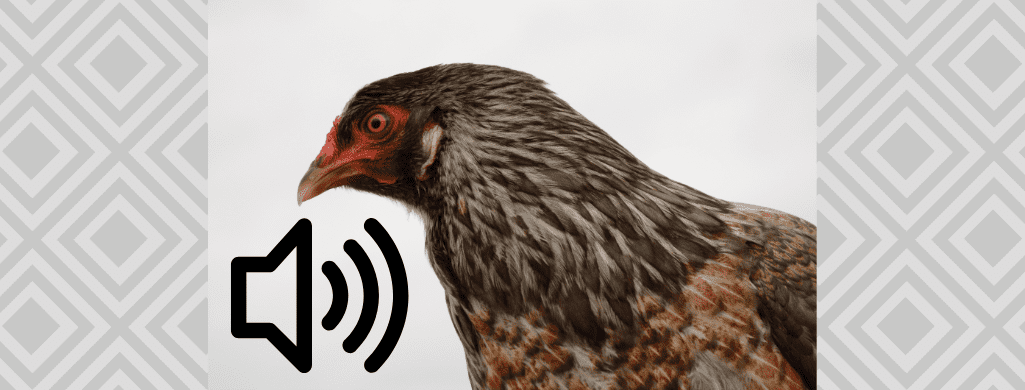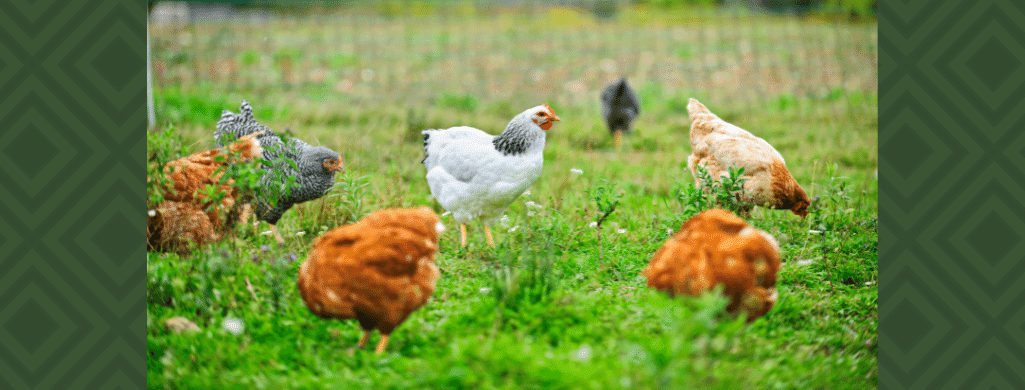Chicken keepers favor Ameraucanas because they lay blue eggs and are docile birds.
These dependable layers even provide a steady supply of eggs in winter.
If you want to raise chickens in your backyard, it is crucial to understand how much noise they make.
Some cities have ordinances on the noise levels of backyard poultry.
So, are Ameraucana chickens noisy?
Ameraucana chickens are a bit noisy because they like chattering with each other. But the noise levels of Ameraucanas are still low compared to other breeds of chickens. The only time they cry out is if they are in danger from predators or if the hens are laying eggs.
Keep reading to find out if Ameraucanas are loud and how to keep noisy chickens quiet.

Table of Contents
ToggleAre Ameraucana Chickens Loud?
Ameraucana chickens are usually quiet birds, but it depends on the individual chicken.
Many chicken owners rave about how quiet and calm their Ameraucanas are. Others will claim their Ameraucanas are skittish and loud.
They are still one of the quietest breeds of chickens for a backyard flock.
Ameraucanas enjoy chatter but are only loud if they feel threatened or caught off guard.
The environment around your Ameraucanas has much to do with their noise level.
This American breed craves freedom and prefers free-ranging over staying inside the chicken coop.
If your Ameraucanas get bored and want out of the coop, they make sure you hear about it.
When Ameraucanas are in danger, they cry out as a warning to the rest of the flock.
Ameraucanas are anxious when they feel threatened. This anxiety causes them to be noisier than usual.
The fluffy feathers on an Ameraucana’s cheeks block its peripheral vision. Due to this physical feature, the birds are always on alert.
It is normal for roosters of any chicken breed to crow, and the same goes for Ameraucana roosters.
The rooster’s job is to protect the flock; they are the first to sound the alarm when predators are nearby.
Ameraucana hens are much quieter in comparison. But they do sing a song when laying eggs.
As a whole, Ameraucanas are quiet birds and make excellent additions to a backyard flock.
Are Ameraucana Roosters Aggressive?
Ameraucana roosters are not aggressive toward people but may act cautiously around you.
This cautious behavior is sometimes confused with aggression.
In reality, Ameraucana roosters are a bit skittish.
As long as they are not bullied, Ameraucana roosters get along well with other types of chickens.
Ameraucana roosters do not attack without being provocation.
Extra roosters in the flock are a recipe for trouble.
Keeping the ratio of roosters to hens balanced avoids conflicts.
Keep in mind roosters have a broad range of personalities. Some roosters are more aggressive than others.
What Kind of Temperament Do Ameraucanas Have?
Ameraucanas are friendly birds, and they avoid conflict whenever possible.
These cuddly chickens do well with children but tend to be shy.
Ameraucanas are intelligent, and they learn the difference between friend and foe.
These curious birds like to check out their surroundings.
Your Ameraucanas might even follow you around while you do chores to see what you are doing.
Further Reading: Can you eat Ameraucana chickens?

Do Ameraucanas Get Along With Other Chicken Breeds?
Ameraucanas are in the middle of the pecking order in a mixed flock.
These friendly birds are usually bullied because they do not stick up for themselves.
The muff and beard feathers make Ameraucanas look different from other chicken breeds.
Their physical traits make Araucanas a target for bullying.
Ameraucanas are medium-sized birds. Hens weigh 5.5 pounds on average, while roosters weigh up to 7 pounds.
Keep Ameraucanas in a mixed flock with birds of a similar size. This minimizes bullying behavior from larger chickens.
Breeds like Barred Plymouth Rocks, Araucanas, and Legbars get along well with Ameraucanas.
The Buff Orpington is a larger bird, but its temperament makes them suitable for a mixed flock.
Avoid aggressive breeds like Rhode Island Reds and Wyandottes.
What Is Normal Behavior for Quiet Chickens?
Roosters of any breed are loud sometimes, no matter what you do.
If your flock does not have a rooster, one of the dominant Ameraucana hens takes over as the leader.
The dominant hen calls out to the rest of the flock if she finds food or sees a predator.
Ameraucana hens do not crow like roosters, but her warning cries are much louder than normal clucking.
If you hear your chickens cry out, investigate to ensure they are not in danger.
Is There a Way to Keep Noisy Chickens Quiet?
If you have concerns about the noise level of your backyard flock, there are several ways to quiet them.
Offer Protection Against Predators
Ameraucana chickens are noisy when they sense danger nearby.
These active birds can escape from danger because they lack tails for predators to grab. Even still, Ameraucanas are a bit skittish.
Make your Ameraucanas feel secure so they stay quiet.
Covering the chicken run reduces threats from aerial predators when your Ameraucanas are outside.
A covered run also provides shade to Ameraucanas in warmer climates.
Place a fence around your flock’s free-range area to keep large ground predators out.
Sealing cracks in the chicken coop and securing the door at night makes your Ameraucanas feel safe.
These simple steps reduce the risk of predator attacks on your flock, giving your chickens peace of mind.
Ensure They Have Plenty of Food and Water
Ameraucana chickens cry to inform you when their food and water supplies are low.
Provide access to food and fresh water to your chickens at all times.
When your Ameraucanas feel secure about their food and water, they do not need to alert you.
Further Reading: What Do Ameraucana Chickens Eat?
Provide Enough Nesting Boxes
Laying hens will fight each other if there are not enough nesting boxes.
The coop must have at least one nesting box for every 3-4 laying hens.
You do not need a nesting box for every laying hen in the flock.
All your hens are unlikely to lay eggs at the same time.
Keep Their Environment Clean
Clean the chicken coop and run regularly.
Ideal conditions keep your flock happy and quiet.
Change the bedding in the coop once per week.
Deep clean the entire coop once a month and dust for mites.

Do Not Keep Too Many Roosters
If you keep roosters in the flock, do not have too many.
Roosters fight each other over dominance and are noisier than hens.
One rooster for every ten hens is a good ratio.
You may even choose not to keep any roosters at all if you wish.
Provide Them With Plenty of Space
Overcrowding your Ameraucanas makes them irritable and aggressive toward each other.
Ameraucanas are medium-sized birds.
You need at least 4’ square feet of space per bird inside the chicken coop.
Provide 15’ square feet per bird in the chicken run.
Add roosting bars at least 12” inches apart, so your Ameraucanas have plenty of space to sleep.
Give Them Toys
Ameraucanas make a lot of noise when they get bored.
They are active birds and hate being stuck inside the coop.
Their small pea combs and wattles offer Ameraucanas protection from frostbite in cold weather.
But in colder climates with lots of snow, there are times when your Ameraucanas must stay inside the coop.
Keep your birds quiet by adding some toys in the coop and run for a distraction.
Give your Ameraucanas chicken swings and cabbage tetherballs for hours of entertainment.
Don’t Wake the Neighbors
Ameraucanas are one of the quietest chicken breeds for a backyard flock.
They make noise when scared or surprised. Helping your Ameraucanas feel secure avoids these incidents.
Provide your Ameraucanas with plenty of chicken feed, clean water, and space. This prevents aggressive behavior in the flock.
Lots of outdoor time and toys keep these adventurous chickens happy and entertained.
These steps keep your chickens quiet and avoid noise complaints from your neighbors.
To learn more about the behavior of Ameraucanas, read Do Ameraucana Chickens Get Along Well?
How useful was this post?
Click on a star to rate it!
We are sorry that this post was not useful for you!
Let us improve this post!
Tell us how we can improve this post?
